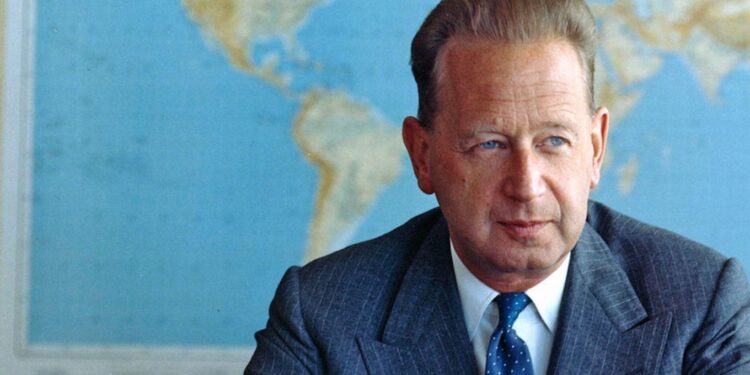Dag Hammarskjöld, a name that resonates with diplomacy, integrity, and an unwavering commitment to peace, served as the second Secretary-General of the United Nations from 1953 until his tragic death in 1961. His tenure was marked by challenges, but his dedication to resolving conflicts and promoting international cooperation left an indelible mark on the world stage.
Born on July 29, 1905, in Jönköping, Sweden, Hammarskjöld came from a family with a strong tradition of public service. His father, Hjalmar Hammarskjöld, was a prominent statesman and Prime Minister of Sweden. This familial influence, coupled with his own intellect and passion for international affairs, laid the foundation for a remarkable diplomatic career.
Hammarskjöld’s journey at the United Nations began in 1953 when he assumed the role of Secretary-General. At the time, the Cold War was casting its shadow over global affairs, and tensions between superpowers were high. Despite these challenges, Hammarskjöld approached his role with a firm commitment to neutrality and the belief that the United Nations could serve as a platform for dialogue and conflict resolution.
One of his earliest and most significant achievements was his role in the peaceful resolution of the Suez Crisis in 1956. When Egypt nationalized the Suez Canal, a critical waterway controlled by British and French interests, it triggered a military intervention by these powers. Hammarskjöld’s diplomatic finesse and skillful negotiation not only prevented a full-scale war but also led to the withdrawal of foreign troops from Egypt. This success elevated him to a symbol of effective international diplomacy.
However, Hammarskjöld faced criticism and resistance, especially from some Western powers, for his impartial stance and dedication to the principles of the United Nations Charter. He believed that the Secretary-General should act independently, guided solely by the best interests of the international community. This commitment often placed him in a precarious position, caught between the conflicting interests of powerful nations.
Tragically, Hammarskjöld’s term as Secretary-General was cut short on September 18, 1961, when his plane crashed in Ndola, Northern Rhodesia (now Zambia), while he was on a peace mission to the newly independent Congo. The circumstances surrounding the crash remain shrouded in mystery, with various theories suggesting foul play. Hammarskjöld’s death was a significant loss for the international community, and the world mourned the passing of a dedicated peacemaker.
Hammarskjöld’s legacy extends beyond his diplomatic achievements. His philosophical reflections, captured in his posthumously published book “Markings,” reveal a deeply introspective and spiritual side. Through his writings, Hammarskjöld grappled with the complexities of leadership, moral responsibility, and the search for meaning in the face of global challenges. His reflections offer a rare glimpse into the mind of a statesman who sought to balance the demands of political pragmatism with a profound sense of moral duty.
One of the most famous passages from “Markings” encapsulates Hammarskjöld’s philosophy: “For all that has been, Thanks. For all that will be, Yes.” This simple yet profound expression reflects his gratitude for the past and his unwavering commitment to a future shaped by positive action and affirmation.
Hammarskjöld’s impact on the United Nations endures through the Dag Hammarskjöld Foundation, established in his memory. The Foundation serves as a platform for research, dialogue, and engagement on issues related to international peace, development, and human rights. It strives to carry forward Hammarskjöld’s legacy by promoting responsible and visionary leadership in a changing world.
In recognizing Hammarskjöld’s contributions, the international community has posthumously honored him in various ways. The Hammarskjöld Medal, awarded to individuals who have demonstrated exceptional service to the United Nations and its principles, stands as a testament to his enduring influence. Additionally, the Dag Hammarskjöld Library at the United Nations headquarters in New York preserves his legacy by providing a repository of knowledge and information for diplomats, researchers, and the general public.
Dag Hammarskjöld’s life and work remind us of the importance of principled leadership in the pursuit of global peace. In an era marked by complex geopolitical dynamics and persistent challenges, his example serves as an inspiration for leaders striving to navigate the intricate web of international relations with integrity and a commitment to the greater good. As we reflect on his legacy, we are reminded that the quest for peace requires not only diplomatic skill but also the unwavering dedication to the ideals of justice, equality, and cooperation – principles that Hammarskjöld embodied throughout his remarkable career.




Recent Comments